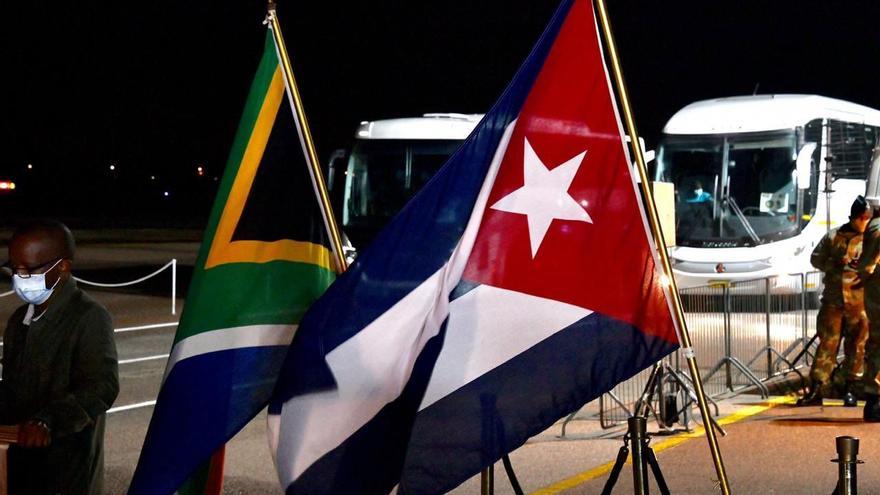
![]() 14ymedio, Madrid, 30 August 2021 — The leader of the South African opposition party Democratic Alliance, Kobus Marais, has demanded that the government stop the payment of 12.3 million dollars pending to Cuba for the illegal acquisition of interferon alfa-2b in April 2020. The total amount of the sale was $14.7 million, although it was initially estimated at $17 million.
14ymedio, Madrid, 30 August 2021 — The leader of the South African opposition party Democratic Alliance, Kobus Marais, has demanded that the government stop the payment of 12.3 million dollars pending to Cuba for the illegal acquisition of interferon alfa-2b in April 2020. The total amount of the sale was $14.7 million, although it was initially estimated at $17 million.
Last week, the new South African Defense Minister, Thandi Modise, warned the Army that “heads will roll” over the controversial import. The case was uncovered in the African country in November 2020, when it was learned that the South African Armed Forces invested large amounts of money buying the drug from Cuba at the beginning of the pandemic, when they believed that the country was suffering from a biological war.
The drug regulatory body Sahpra did not want to buy the Cuban product because it had not been shown to be suitable for the treatment of covid-19, but the Army acquired it using its powers in case of chemical and bacteriological warfare, arguing that it could protect their soldiers.
After months of controversy and investigation to try to purge responsibilities with little success, the position of the new minister has been appreciated by the Democratic Alliance, but they also consider it insufficient and ask that the contract be terminated and the pending payment canceled.
According to Marais, the contract cannot continue to exist, as the ministry has invalidated it due to flagrant violations, including failure to consult Sahpra on the efficacy of the drug, as well as violation of government procurement laws and import regulations from South Africa as there is no evidence as to whether a Treasury and Trade and Industry exemption was sought for the exclusive purchase of the drug.
The opposition leader demands immediate measures, since Defense Secretary Gladys Kudjoe revealed that the Government of Cuba is pressing for the missing amount to be paid.
Despite her position, Minister Modise believes that South Africa’s relationship with Havana should not be damaged just because Defense acted outside the law, but Alianza Democrática believes that not paying an illegal contract does not have to imply a diplomatic breakdown.
“The Department of Defense and Cuba should not have entered into a pharmaceutical drug supply agreement without a certificate of approval from Sahpra,” says Marais, who once again calls into question the validity of interferon in the treatment of COVID-19.
Interferon alfa-2b, manufactured by the state company BioCubaFarma, is used in the treatment of viral infections and was used by China at the beginning of the pandemic in combination with other drugs, but there is still no scientific consensus on its usefulness and there are studies that consider it appropriate, versus others who point out that it can aggravate the disease.
The compound, which Cuba tried to promote since the pandemic arrived, was created in the 1980s and interferes with viral multiplication by creating an inhibition mechanism in the first level of response of the organism.
Alianza Democrática also calls for all officials involved in the case to be charged for their actions. “Not only must heads roll for those who were involved in this appalling abuse of public resources, but they must also be held accountable,” he demanded.
Good relations between Cuba and South Africa began with the rise to power of Nelson Mandela and have continued seamlessly with his successors, Thabo Mbeki (1999-2008), Jacob Zuma (2008-2018) and the current president, Cyril Ramaphosa, but the controversies have not stopped, especially in the last two years.
The irregular purchase of interferon has been joined by the hiring of Cuban engineers to cooperate with the Department of Water and Sanitation, denounced by the unions in the sector, since there are professionals in the country without jobs in a country with unemployment rates above 30%, while staff are recruited who are not licensed to practice in South Africa and must be supervised by a licensed national.
In addition, last July, the South African teachers union complained that specialists from the island hired by the Department of Basic Education to train South African teachers earn almost $56,000 annually, a figure much higher than the salary of locals.
There are also exchanges of South African medical students in Cuba that have been problematic, especially this year, when the students protested that they had little to eat, as a result of the shortages on the island and the ’Ordering Task’*.
*Translator’s note: Tarea ordenamiento, the [so-called] ‘Ordering Task’ is a collection of measures that includes eliminating the Cuban Convertible Peso (CUC), leaving the Cuban peso as the only national currency, raising prices, raising salaries (but not as much as prices), opening stores that take payment only in hard currency which must be in the form of specially issued pre-paid debit cards, and others.
____________
COLLABORATE WITH OUR WORK: The 14ymedio team is committed to practicing serious journalism that reflects Cuba’s reality in all its depth. Thank you for joining us on this long journey. We invite you to continue supporting us by becoming a member of 14ymedio now. Together we can continue transforming journalism in Cuba.
